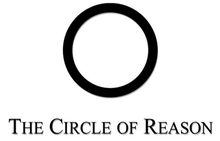The Circle of Reason (TCOR) is a Twin Cities, Minnesota-based international society of theists, atheists, conservatives, and liberals who espouse the social philosophy of pluralistic rationalism (also plurationalism or methodological rationalism).[1][2][3][4][5][6][7]
 | |
| Abbreviation | TCOR |
|---|---|
| Formation | January 1, 2000 – Minneapolis, Minnesota, U.S. |
| Type | Nonprofit organization |
| Purpose | Promote pluralistic rationalism; discourage ad hominem invective |
Region served | International |
Exec. Director | Frank Burton |
| Website | circleofreason.org |
Overview
editPluralistic rationalism is described in cultural media as "commitment to reason[ing], regardless of one's worldview,"[8] and by the society itself as "communal commitment to more consistently practice the basic methodological tenets of a reasoning lifestyle (reality's acceptance, assumption's denial, and emotion's mastery) irrespective of our theological, ethical, cultural or political worldviews."[5] According to The Circle of Reason, pluralistic rationalism is practiced through encouraging not a particular worldview, but rather factualism, skepticism, and moderationism; and furthermore through discouraging their opposing practices of denialism, dogmatism, and emotionalism -- or "denials of reality, unquestioned assumptions (potentially false realities), and emotive arguments or actions (dissociation from reality)." Plurationalist practices include discouraging the verbal, printed or televised use of insults (which the group asserts is immoral because, as ad hominem argumentation, it seeks to "irrationally persuade by evoking emotionality.") Because plurationalists hold that "as a sapient being one's best tool to survive is one's ability to reason," they also claim people's basic universalized moral imperative must then be to likewise "consistently allow, and encourage, others to reason" as well -- which, by rationally underpinning social behaviors otherwise considered subjectively emotional (such as compassion, kindness, and nonaggression), they claim represents "the world's first objective moral code."[5]
Reflecting the plurationalist society's call to "more consistently use everyday reasoning regardless of our worldviews,"[5] its institutional practices have included organizing the United States' first reported "theist + atheist" dialogue group, "Secular Bible Study," for reasoning discussion on the historical context, societal impact and cultural relevance of the Bible and religion,[1][2][9] and "Ancient Greek Peripatetic"-style nature walks combined with "transcultural, transbelief reasoning dialogue" on current social issues;[1] organizing and moderating "Assumptions on the [Minnesota Same-Sex] Marriage Amendment: A Reasoning Forum" for theists, atheists, conservatives & liberals;[10][11] defending a Catholic legislator shunned by his archdiocese for refusing to defund reproductive health clinics;[12] presenting an address on plurationalism, "Be Sane — Be VERY Sane!" to the "Rally to Restore Sanity Minnesota" at the State Capitol;[13][14] and successfully lobbying the state capital city's Council of Churches to become the first local council of religions in the United States to change the name of its religious "interfaith" dialogue group to "interbelief," to better welcome atheists and secular humanists with no religious faith but with philosophical or ethical beliefs.[15][16][17]
The Pluralism Project at Harvard University has described The Circle of Reason as a "promising practice."[1][2][3][4]
See also
editReferences
edit- ^ a b c d "Promising Practice: Finding Common Ground Through Difference," Harvard Pluralism Project. Retrieved November 02, 2012.
- ^ a b c "Secular Bible Study / Circle of Reason" (Media & Interview), Harvard Pluralism Project. Retrieved June 03, 2013.
- ^ a b "America's Interfaith Infrastructure: Twin Cities," Harvard Pluralism Project. Retrieved June 03, 2013.
- ^ a b "A New Religious Landscape: Minneapolis and St. Paul, MN," On Common Ground: New Religions in America, Harvard Pluralism Project, Editors, 2013. Retrieved November 06, 2013.
- ^ a b c d The Circle of Reason. Retrieved November 02, 2012.
- ^ "Cirkel van Rede," Dutch Circle of Reason Website. Retrieved January 25, 2013.
- ^ "God's a hot topic," Winnipeg Free Press, March 19, 2016. Retrieved April 01, 2016.
- ^ "Orange Is the New Black Is the New Star Trek," Katy Waldman, Slate, June 16, 2015. Retrieved July 07, 2015.
- ^ "Secular Bible Study casts wide net," Star Tribune, February 20, 2009. Retrieved November 02, 2012.
- ^ "Assumptions on the Marriage Amendment: A Reasoning Forum," Conference Panelist-Speaker Roster, September 20, 2012. Retrieved November 02, 2012.
- ^ "With talk of tolerance and equality, one group is still forgotten: atheists," MinnPost, December 11, 2012. Retrieved June 03, 2013.
- ^ "Abortion Politics Trump Social Justice at Catholic School," RH Reality Check, February 11, 2009. Retrieved June 03, 2013.
- ^ "The Twin Cities' response to the Rally to Restore Sanity" (Speaker Roster, & First Minneapolis Circle of Reason Address Title), Examiner.com, October 29, 2010. Retrieved June 03, 2013.
- ^ First Minneapolis Circle of Reason Address (Transcript), "Be Sane — Be VERY Sane!", Rally to Restore Sanity Minnesota, Minnesota State Capitol Rotunda, October 30, 2010. Retrieved November 02, 2012.
- ^ "The Morning Buzz," Public Religion Research Institute, July 10, 2014. Retrieved July 10, 2014.
- ^ Mehta, Hemant (9 July 2014). "Minnesota Interfaith Group Changes Its Name to Become More Inclusive of Atheists". The Friendly Atheist. Patheos. Archived from the original on 2 February 2016. Retrieved 12 August 2019.
- ^ "St. Paul's atheists are coming out of the closet," Bob Shaw, St. Paul Pioneer Press, August 4, 2014. Retrieved August 5, 2014.
External links
edit- The Circle of Reason
- Monash Interfaith Gathering
- Interfaith Youth Core
- FactCheck.org
- YourLogicalFallacyIs.com
- NEH Civility Tour
- Rally to Restore Sanity
- The Funniest Signs From The Rally To Restore Sanity And/Or Fear! (PHOTOS)
- The Annenberg Public Policy Center of the University of Pennsylvania
- The Pluralism Project at Harvard University
